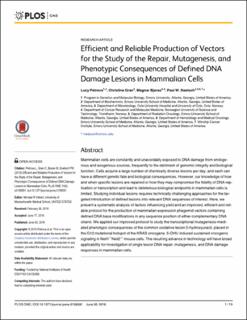| dc.contributor.author | Petrova, Lucy | |
| dc.contributor.author | Neurauter, Christine Gran | |
| dc.contributor.author | Bjørås, Magnar | |
| dc.contributor.author | Doetsch, Paul W | |
| dc.date.accessioned | 2020-06-17T10:43:17Z | |
| dc.date.available | 2020-06-17T10:43:17Z | |
| dc.date.created | 2016-09-20T15:53:46Z | |
| dc.date.issued | 2016 | |
| dc.identifier.citation | PLOS ONE. 2016, 11 (6), . | en_US |
| dc.identifier.issn | 1932-6203 | |
| dc.identifier.uri | https://hdl.handle.net/11250/2658431 | |
| dc.description.abstract | Mammalian cells are constantly and unavoidably exposed to DNA damage from endogenous and exogenous sources, frequently to the detriment of genomic integrity and biological function. Cells acquire a large number of chemically diverse lesions per day, and each can have a different genetic fate and biological consequences. However, our knowledge of how and when specific lesions are repaired or how they may compromise the fidelity of DNA replication or transcription and lead to deleterious biological endpoints in mammalian cells is limited. Studying individual lesions requires technically challenging approaches for the targeted introduction of defined lesions into relevant DNA sequences of interest. Here, we present a systematic analysis of factors influencing yield and an improved, efficient and reliable protocol for the production of mammalian expression phagemid vectors containing defined DNA base modifications in any sequence position of either complementary DNA strand. We applied our improved protocol to study the transcriptional mutagenesis-mediated phenotypic consequences of the common oxidative lesion 5-hydroxyuracil, placed in the G12 mutational hotspot of the KRAS oncogene. 5-OHU induced sustained oncogenic signaling in Neil1-/-Neil2-/- mouse cells. The resulting advance in technology will have broad applicability for investigation of single lesion DNA repair, mutagenesis, and DNA damage responses in mammalian cells. | en_US |
| dc.language.iso | eng | en_US |
| dc.publisher | Public Library of Science | en_US |
| dc.rights | Navngivelse 4.0 Internasjonal | * |
| dc.rights.uri | http://creativecommons.org/licenses/by/4.0/deed.no | * |
| dc.title | Efficient and Reliable Production of Vectors for the Study of the Repair, Mutagenesis, and Phenotypic Consequences of Defined DNA Damage Lesions in Mammalian Cells | en_US |
| dc.type | Peer reviewed | en_US |
| dc.type | Journal article | en_US |
| dc.description.version | publishedVersion | en_US |
| dc.source.pagenumber | 19 | en_US |
| dc.source.volume | 11 | en_US |
| dc.source.journal | PLOS ONE | en_US |
| dc.source.issue | 6 | en_US |
| dc.identifier.doi | 10.1371/journal.pone.0158581 | |
| dc.identifier.cristin | 1383445 | |
| dc.description.localcode | © 2016 Petrova et al. This is an open access article distributed under the terms of the Creative Commons Attribution License, which permits unrestricted use, distribution, and reproduction in any medium, provided the original author and source are credited. | en_US |
| cristin.ispublished | true | |
| cristin.fulltext | original | |
| cristin.qualitycode | 1 | |

